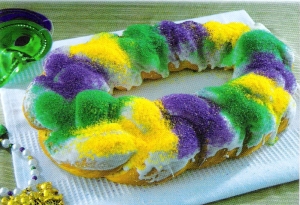 January 6th is the Catholic feast day Epiphany, which comes from the Greek for appearance. Also known as “Twelfth Night,” it marks the presentation of the infant Jesus to the Magi or Wise Men. And in much of the Christian world, it is day on which Christmas gifts are exchanged.
January 6th is the Catholic feast day Epiphany, which comes from the Greek for appearance. Also known as “Twelfth Night,” it marks the presentation of the infant Jesus to the Magi or Wise Men. And in much of the Christian world, it is day on which Christmas gifts are exchanged.
In New Orleans, which never shies away from an opportunity to celebrate, it takes on more meaning. While to many, Epiphany represents the end of the Christmas season, in New Orleans it is also the start of Carnival, which this year ends on Tuesday, February 16th, Mardi Gras day.
In a tradition that dates back to the 18th Century, It begins with “King Cake,” a baked confection decorated with purple, green, and gold sugar. The cake contains a trinket (often a plastic baby) or dried bean. The person who gets the prize may be required to supply the next cake. King Cake parties are common throughout the Carnival season.
While most focus on the Mardi Gras parades leading up to Mardi Gras itself, Carnival also features dances, masked balls, and debutante coming out parties. And even though most krewes and social clubs parade over the days leading up to Mardi Gras, there are some parades sprinkled throughout the season. In fact, on Epiphany itself, the members of the Phunny Phorty Phellows mask and take over the St. Charles Streetcar Line to mark the beginning of the next season of festivities.